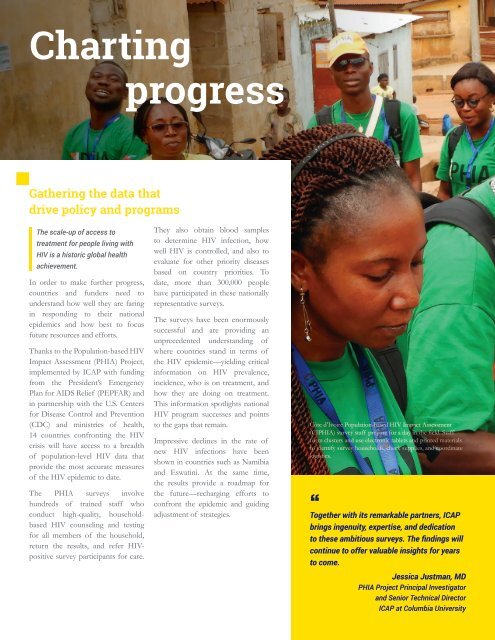ICAP: Empowering Health for 15 Years
This booklet celebrates ICAP's 15th anniversary with beautiful images and major milestones in the organization's history.
This booklet celebrates ICAP's 15th anniversary with beautiful images and major milestones in the organization's history.
Create successful ePaper yourself
Turn your PDF publications into a flip-book with our unique Google optimized e-Paper software.
Charting<br />
progress<br />
Gathering the data that<br />
drive policy and programs<br />
The scale-up of access to<br />
treatment <strong>for</strong> people living with<br />
HIV is a historic global health<br />
achievement.<br />
In order to make further progress,<br />
countries and funders need to<br />
understand how well they are faring<br />
in responding to their national<br />
epidemics and how best to focus<br />
future resources and ef<strong>for</strong>ts.<br />
Thanks to the Population-based HIV<br />
Impact Assessment (PHIA) Project,<br />
implemented by <strong>ICAP</strong> with funding<br />
from the President’s Emergency<br />
Plan <strong>for</strong> AIDS Relief (PEPFAR) and<br />
in partnership with the U.S. Centers<br />
<strong>for</strong> Disease Control and Prevention<br />
(CDC) and ministries of health,<br />
14 countries confronting the HIV<br />
crisis will have access to a breadth<br />
of population-level HIV data that<br />
provide the most accurate measures<br />
of the HIV epidemic to date.<br />
The PHIA surveys involve<br />
hundreds of trained staff who<br />
conduct high-quality, householdbased<br />
HIV counseling and testing<br />
<strong>for</strong> all members of the household,<br />
return the results, and refer HIVpositive<br />
survey participants <strong>for</strong> care.<br />
They also obtain blood samples<br />
to determine HIV infection, how<br />
well HIV is controlled, and also to<br />
evaluate <strong>for</strong> other priority diseases<br />
based on country priorities. To<br />
date, more than 300,000 people<br />
have participated in these nationally<br />
representative surveys.<br />
The surveys have been enormously<br />
successful and are providing an<br />
unprecedented understanding of<br />
where countries stand in terms of<br />
the HIV epidemic—yielding critical<br />
in<strong>for</strong>mation on HIV prevalence,<br />
incidence, who is on treatment, and<br />
how they are doing on treatment.<br />
This in<strong>for</strong>mation spotlights national<br />
HIV program successes and points<br />
to the gaps that remain.<br />
Impressive declines in the rate of<br />
new HIV infections have been<br />
shown in countries such as Namibia<br />
and Eswatini. At the same time,<br />
the results provide a roadmap <strong>for</strong><br />
the future—recharging ef<strong>for</strong>ts to<br />
confront the epidemic and guiding<br />
adjustment of strategies.<br />
Côte d’Ivoire Population-based HIV Impact Assessment<br />
(CIPHIA) survey staff prepare <strong>for</strong> a day in the field. Staff<br />
<strong>for</strong>m clusters and use electronic tablets and printed materials<br />
to identify survey households, check supplies, and coordinate<br />
logistics.<br />
“<br />
Together with its remarkable partners, <strong>ICAP</strong><br />
brings ingenuity, expertise, and dedication<br />
to these ambitious surveys. The findings will<br />
continue to offer valuable insights <strong>for</strong> years<br />
to come.<br />
Jessica Justman, MD<br />
PHIA Project Principal Investigator<br />
and Senior Technical Director<br />
<strong>ICAP</strong> at Columbia University


